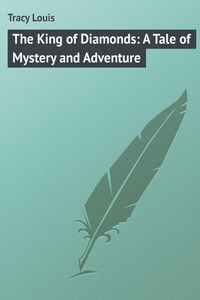Derby Day fell that year on the first Wednesday in June. By a whim of the British climate, the weather was fine; in fact, no rain had fallen on southern England since the previous Sunday. Wise after the event, the newspapers published cheerful “forecasts,” and certain daring “experts” discussed the probabilities of a heat wave. So London, on that bright Wednesday morning, was agog with excitement over its annual holiday; and at such a time London is the gayest and liveliest city in the world.
And then, wholly independent of the weather, there was the Great Question.
From the hour when the first ’bus rumbled Citywards until some few seconds before three o’clock in the afternoon the mass of the people seemed to find delight in asking and answering it. The Question was ever the same; but the answer varied. In its way, the Question formed a tribute to the advance of democracy. It caused strangers to exchange opinions and pleasantries in crowded trains and omnibuses. It placed peers and commoners on an equality. During some part of the day it completely eclipsed all other topics of conversation.
Thus, young Lord Medenham made no pretense of shirking it while he stood on the steps of his father’s mansion in Cavendish Square and watched his chauffeur stowing a luncheon basket beneath the front seat of the Mercury 38.
“You know a bit about racing, Tomkinson,” he said, smiling at the elderly butler who had brought the basket out of the house. “What’s going to win?”
“The King’s horse, my lord,” replied Tomkinson, with the unctuous conviction of a prelate laying down a dogma.
“Is it as sure as all that?”
“Yes, my lord.”
“Well, I hope so. You are on a sovereign – By gad, you really are, you know.”
Tomkinson was far too keenly alive to the monetary side of the transaction to pay heed to the quip. His portly figure curved in a superb bow.
“Thank you, my lord,” said he.
“Remind me this evening if you are right. I shall not forget to damn you if you are wrong.”
Tomkinson ignored the chance of error and its consequences.
“Your lordship will be home for dinner?”
“Yes, I have no other engagement. All ready, Dale?” for the chauffeur was in his seat, and the engine was purring with the placid hum of a machine in perfect tune.
Tomkinson moved grandly down the steps, ushered Viscount Medenham into the car, and watched its graceful swoop into Holles Street.
“Times have changed,” said he to himself. “Twenty years ago, when I first came here, his lordship’s father would have given me a tip, and he wouldn’t have been coming home for dinner, neether.”
By that last fatal word Tomkinson betrayed the cloven hoof. At least, he was no prelate – and his assumption of the prophetic rôle would soon be put to the test. But he had answered the Great Question.
The Mercury crossed Oxford Street and insinuated itself into the aristocratic narrowness of Mayfair. It stopped in Curzon Street, opposite a house gay with flowers in window-boxes. The Viscount looked at his watch.
“How far to Epsom?” he asked over Dale’s shoulder.
“About sixteen miles by the direct road, my lord, but it will be best to go round by Kingston and avoid the worst of the traffic. We ought to allow an hour for the run.”
“An hour!”
“We are not in France now, my lord. The police here would have spasms if they saw the car extended.”
Lord Medenham sighed.
“We must reason with them,” he said. “But not to-day. Lady St. Maur declares she is nervous. Of course, she doesn’t know our Mercury. After to-day’s experience it will be quite another matter when I take her to Brighton for lunch on Sunday.”
Dale said nothing. He had met his employer at Marseilles in October, when Lord Medenham landed from Africa; during the preceding twelve months his license had been indorsed three times for exceeding the speed limit on the Brighton Road, and he had paid £40 in fines and costs to various petty sessional courts in Surrey and Sussex. Sunday, therefore, promised developments.
Medenham seemed to think that his aunt, Lady St. Maur, would be waiting for him on the doorstep. As no matronly figure materialized in that locality, he alighted, and obeyed a brass-lettered injunction to “knock and ring.” Then he disappeared inside the house, and remained there so long that Dale’s respect for the law began to weaken. The chauffeur had been given a racing certainty for the first race; the hour was nearing twelve, and every road leading to Epsom Downs would surely be congested.
His lordship came out, alone, and it was clear that the unexpected had happened.
“Nice thing!” he said, with the closest semblance to a growl that his good-natured drawl was capable of. “The whole show is busted, Dale. Her ladyship is in bed with her annual bilious attack – comes of eating forced strawberries, she says. And she adores strawberries. So do I. There’s pounds of ’em in that luncheon basket. Who’s going to eat ’em?”
Dale foresaw no difficulties in that respect, but he did realize at once that his master cared little about racing, and, so far as Epsom was concerned, would abandon the day’s excursion without a pang. He grew desperate. But, being something of a stoic, he kept his feelings in check, and played a card that could hardly fail.














